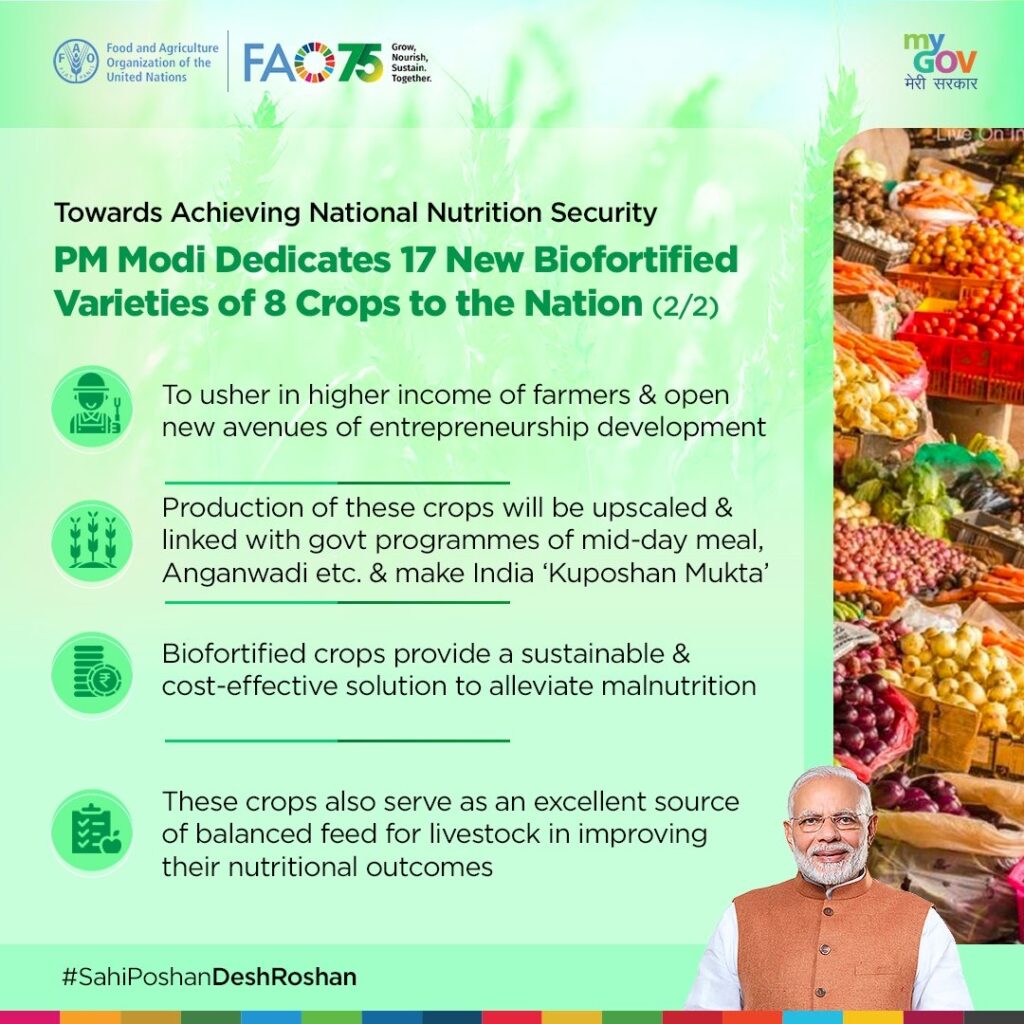Indian Prime Minister Narendra Modi has given a strong endorsement to staple crop biofortification as a sustainable and cost-effective solution to alleviate malnutrition.
On World Food Day 2020, during a ceremony to mark the 75th anniversary of the United Nations Food and Agriculture Organization (FAO), the Prime Minister noted that common varieties of some crops lack key micronutrients that are essential for good health, and thus biofortified varieties were developed to overcome these shortcomings.
He also “dedicated to the nation” 17 recently-developed biofortified seed varieties of local and traditional crops, including wheat and paddy rice, that are being made available to Indian farmers. He said this is an important step in strengthening the government’s campaign to improve nutrition.
According to Indian media reports, the national government intends to scale up production of biofortified crop varieties and integrate them in government support programs, such as midday meals for school children, to reach the most vulnerable population groups.
Prime Minister Modi’s endorsement of biofortification to address widespread micronutrient deficiency comes amid growing official interest in India in this nutrition strategy, which primarily targets low-income smallholder farming families who rely on wheat, millet, and other staples for the bulk of their diets.
The Government of Bihar State, India’s third most populous state with the country’s highest rate of stunting, recently committed to rapidly scale up production of zinc wheat seed to reach millions more vulnerable farming families (zinc deficiency is a major cause of stunting). The Bihar Government also established a “Nutritional Village” where 475 households will cultivate biofortified crops to help promote these varieties.
In 2018, the Indian Council of Agricultural Research (ICAR) established minimum levels of iron and zinc to be bred in national varieties of pearl millet, providing a strong regulatory push for the development biofortified varieties of pearl millet.
HarvestPlus welcomes the strong commitments from the Prime Minister and other leaders in India. HarvestPlus has operated in the country for nearly nine years, in close collaboration with ICAR, India’s State Agricultural Universities (SAUs), the International Crops Research Institute for the Semi-Arid Tropics (ICRISAT), the International Maize and Wheat Improvement Center (CIMMYT), seed companies, farmer organizations, and community organizations.
The biofortified crops promoted in India by these partners—iron pearl millet, zinc wheat, and iron lentil—help alleviate micronutrient deficiencies when they are eaten regularly. The shared goal of HarvestPlus and our partners is to accelerate access to these nutritious crops and the foods made from them to boost food and nutrition security and improve lives.
The Indian Council of Agricultural Research (ICAR), a close partner of HarvestPlus, said the biofortified varieties mentioned by the Prime Minister include:
• zinc rice CR Dhan 315;
• wheat varieties HI 1633 rich in protein, iron and zinc, HD 3298 rich in protein and iron, and DBW 303 and DDW 48 rich in protein;
• Ladhowal Quality Protein Maize Hybrid 1, 2 and 3 rich in lysine and tryptophan;
• CFMV1 and 2 of finger millet rich in calcium, iron and zinc;
• CLMV1 of little Millet rich in iron and zinc;
• Pusa Mustard 32 with low erucic acid;
• Girnar 4 and 5 of groundnut with enhanced oleic acid;
• yam variety Sri Neelima and DA 340 with enhanced zinc, iron and anthocyanin content.
Governments, through their ability to harness public sector resources and lead on policy, play an essential role in scaling up biofortification and enabling activity in the private sector. HarvestPlus and its partners are working with governments in Africa, Asia, and Latin America/Caribbean, as well as private sector, NGO, and civil society partners, to reach 1 billion people with nutritious biofortified crops and foods by 2030. HarvestPlus is part of the CGIAR Program on Agriculture for Nurition and Health (A4NH).
For more information about HarvestPlus activities in India, contact:
Binu Cherian: [email protected]
